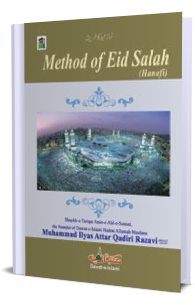Madani Muzakarah
Praying Eid Salah alone
Q: If, due to certain circumstances, a person cannot offer Eid salah in congregation, is he allowed to pray it alone?
A: Eid salah cannot be prayed alone.[1] It must be offered with a congregation, and the congregation and Imam must meet certain conditions. Even if the Imam fulfils the conditions for leading the five daily prayers, he must satisfy further criteria to lead Eid and Jumu’ah prayers. In conclusion, if a person is unable to offer the Eid salah due to negligence or a mistake on his part, and he could not find anywhere else in his respective city to pray it in congregation, he will be sinful and must repent.[2]
A foolish family
Q: Which type of family is foolish?
A: The family which incites spouses against each other and against their in-laws, spewing things like, “Your mother-in-law the old witch berated you. Why didn’t you answer her!” The family which seeds disputes like this and destroys the married life of their daughter or sister is a truly foolish one. The evillest is the daughter-in-law who speaks ill of her in-laws to her mother, sisters, brothers, and father. However, it should be remembered that not every mother or sister is so foolish as to encourage their daughter or sister if she returns home after having an argument. Rather, some of them do guide her properly.[3]
Impact of burping on wudu and salah
Q: Does burping in salah invalidate the wudu and salah?
A: Burping during Salah neither invalidates Wudu nor Salah.[4]
Addressing your father with the singular tu or tum (in Urdu)?
Q: Is it improper to address your father with tu or tum?
A: It depends on the social norms of the community. For example, in our community, it is considered acceptable to address the mother as tu; it is not a faux pas or disrespectful. Similarly, in Urdu, if it is normal to address the father with tu then there is no harm. However, as far as I am aware, it is not common to refer to the father with this term. Therefore, in the Urdu language, if the father is addressed with tu, it will be disrespectful.[5]
The meaning of a couplet
Q: What is the meaning of this (Urdu) couplet:
Hum to hayn aap dil figaar gham
mein hansi hay na-gawar
Chayr ke gul ko nau-bahar khoon humein rulaaye kyun[6]
A: It means: “My heart is already wounded; laughter is unbearable to me at the moment. For when a person is overcome with grief, they dislike laughing. In fact, they find it unbearable. O new spring! Do not tease me by causing flowers to blossom with your arrival! As I am in a state of grief and laughing is unbearable, seeing them will cause me to cry tears of blood.” Perhaps Ala Hazrat رَحْمَةُ الـلّٰـهِ عَـلَيْـه penned this when leaving Madina.[7]
Trimming nails at a shop or at night?
Q: It is true that trimming your nails at your shop or place of business causes misfortune? Can nails be cut at night?
A: Trimming the nails is not a misfortunate act but a rewarding one, if done with the intention of following the Sunnah. If cutting nails at a shop causes misfortune, then they should not be cut at home either, as misfortune will arrive there too! Cutting them within 40 days is a Sunnah. If more than 40 days have passed and the nails are not cut, then such a person will be sinful. Also, it is permissible to cut the nails at night. It is incorrectly widespread among the people that cutting the nails at night is prohibited.[8]
Eating chicken gizzard
Q: Is it permissible to eat the gizzard of a chicken?
A: If part of the rind of the gizzard which has impurity on it is removed, the remaining flesh can be eaten.[9]
The Nikah of the one who consumes alcohol
Q: If a person drinks alcohol, and 40 days have not yet passed when his nikah is performed, will his nikah be valid?
A: Alcohol is a destructive evil which leads to Hell. Consuming even a single drop of it is completely haram. The one who drinks alcohol is a major sinner; it is obligatory (farḍ) upon him to repent and to make a promise to not drink in the future. However, it has no bearing upon nikah. If someone drinks alcohol, his Nikah will still be valid.[10]
Bereaved family lighting their stove?
Q: If a death takes place within a family, it is said that neither the stove in the house should be lit nor any food cooked. Is this correct?
A: There is no harm in lighting the stove in the home of the deceased, and it permissible to cook food there. These are just burdens that the public have taken upon themselves. There is no place or basis in Islam for such superstitions.[11],[12]
[1] Hidayah, vol. 1, p. 85
[2] Madani Muzakarah, 5 Shawwal 1440 AH
[3] Madani Muzakarah, 5 Shawwal 1440 AH
[4] Madani Muzakarah, 23 Rajab 1440 AH
[5] Madani Muzakarah, 13 Ramadan 1440 AH
[6] Hadaiq e Bakhshish, p. 94
[7] Madani Muzakarah, 29 Sha’ban 1440 AH
[8] Madani Muzakarah, 22 Sha’ban 1440 AH
[9] Madani Muzakarah, 9 Rajab 1440 AH
[10] Madani Muzakarah, 25 Jumadal Aakhir 1440 AH
[11] Ala Hazrat, Imam Ahmad Raza Khan رَحْمَةُ الـلّٰـهِ عَـلَيْـه was asked a similar question: “Is it prohibited to cook chapattis in the home of the deceased?” To which he رَحْمَةُ الـلّٰـهِ عَـلَيْـه replied: “They do not cook anything due to being aggrieved by the death; cooking is not prohibited in the Shari’ah. However, it is Sunnah to send some food only on the first day for the family members, and to ensure they eat it. This food should neither be sent on the second day nor for any additional people other than the people of the household.” (Fatawa Razawiyyah , vol. 9, p. 90)
[12] Madani Muzakarah, 9 Rajab 1440 AH


















Comments